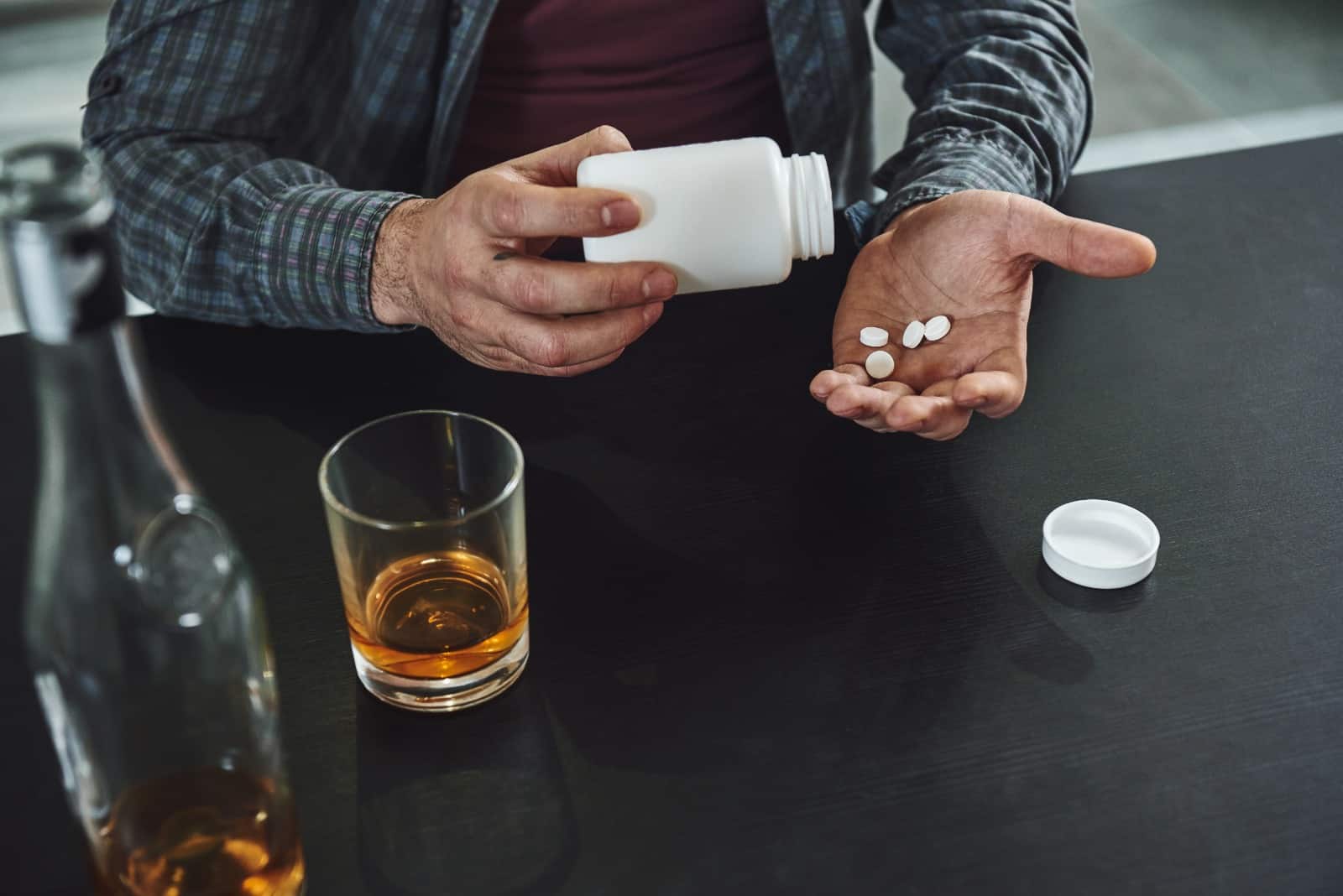
What You Need To Know About Combining Naproxen and Alcohol
Written By
GET IN TOUCH WITH US
Follow Us On Social Media
Receive A Call
What You Need To Know About Combining Naproxen and Alcohol
Naproxen sodium is a common over the counter painkiller, so it might seem harmless to take some after having a couple of drinks, or especially for the post-drinking headache that plagues so many people. But should you be combining naproxen and alcohol?
That said, even the most harmless seeming drug combination can be dangerous if you don’t know what you’re doing, and unfortunately, that can include alcohol and almost all over the counter pain medications.
Here’s what you need to know about Naproxen and Alcohol, and why you shouldn’t combine these two common drugs.
Naproxen And Alcohol, The Basics
Before we get into the reasons that this can be a dangerous drug combination, or why needing to use these drugs together can sometimes be a sign of a deeper problem, let’s talk about what Naproxen and alcohol are, what they do, and how they are used.
Why Do People Drink Alcohol?
Most people already know what alcohol is, but to cover it quickly, alcohol is an intoxicating beverage that can be drunk in order to feel a euphoric high, but that can have serious consequences if you drink too much or too often.
Given the risks, some people wonder why alcohol is so common in our society, and the simple answer is that alcohol can be fun to use, and human beings have a long history with alcohol, both as a recreational drug, and also as a source of nutrition and food preservation.
That said, alcohol has become so common that many people don’t think twice before combining alcohol with other drugs, from over the counter painkillers to caffeine and other recreational drugs, legal and illegal. Naproxen and alcohol can be one of these combinations not commonly thought about as seriously as it should be.
The problem is that combining alcohol with most other drugs can increase the risk of both drugs, even drugs that are just as common as alcohol itself, like caffeine.
Those problems are exacerbated by the fact that a lot of people who use alcohol and other drugs are using those drugs to help cover the negative side effects of the alcohol itself. People might use caffeine to help wake up after a night drinking, or even to try and overcome the effects of inebriation itself.
Of course, this doesn’t work, it just introduces a new drug’s effects and side effects into the mix.
Other people might try to use over the counter painkillers to help counter the feelings of a hangover, or to deal with the headaches that are common while drinking. Unfortunately, like caffeine, combining alcohol with most OTC painkillers, including Naproxen and alcohol or ibuprofen and alcohol (another NSAID) can be dangerous and may not help.
What Is Naproxen Used For
Naproxen Sodium (brand name Aleve) is an NSAID (non-steroidal anti-inflammatory drug), that is available both over the counter, and as a prescription medication for stronger doses. It’s commonly used to help control mild to moderate pain, and can be useful for managing both acute and chronic forms of pain.
Not everyone responds the same way to Naproxen, but it generally has very few, very mild side effects.
However, one of the biggest risks that come with taking Naproxen and other NSAID medications is that they are known to cause bleeding problems, especially when combined with other medications. They can have dangerous side effects if used improperly, and some people may have health conditions that make it better to use a different pain medication when possible.
Why Is It Dangerous To Combine Naproxen And Alcohol
There are a few reasons why it’s generally not a good idea to combine Naproxen and Alcohol, including that alcohol can have a wide range of interactions with other drugs, and that those interactions are more likely to be severe the more you drink.
But in this case, the main reason it’s not a good idea to combine Naproxen and Alcohol is that both drugs can cause stomach ulcers and other forms of digestive bleeding.
To make matters worse, both drugs can increase bleeding, and alcohol acts as a blood thinner.
That means that, in addition to potentially causing stomach ulcers and other problems, these drugs may also increase bleeding in pre-existing stomach ulcers and almost anywhere else that you’re having bleeding.
Bleeding, by itself, isn’t a bad thing. But uncontrolled bleeding, especially internally, is a serious risk and often requires medical treatment. This in itself is why you shouldn’t combine naproxen and alcohol.
Can You Combine Naproxen and Alcohol Without Having Negative Side Effects?
Technically yes, you can combine naproxen and alcohol, but you shouldn’t count on the possibility of having zero side effects to protect you from the possibility of having some.
Think of it this way. Every time you combine naproxen and alcohol too close together, before or after, you’re rolling the dice that you might have a problem, and rolling a separate set of dice that the problem will be serious.
Even if you go several times without having a problem, the chance never goes away, and you never know if the first time you have a problem with combining Naproxen and alcohol will be a severe problem.
Like most risks, it’s better to avoid the risk of a serious drug interaction whenever possible, and to minimize your overall risks as much as you can even if you can’t avoid the risk entirely. That means not drinking and taking Naproxen at the same time and waiting as long as possible after taking Naproxen to start drinking, and waiting as long as possible after drinking to take Naproxen.
If you can avoid combining these drugs within 24 hours of each other, that’s ideal.
Side Effects Of Naproxen
In addition to knowing the risks of combining Naproxen and alcohol, it’s also important to understand the side effects of both drugs.
Here are some of the common side effects of Naproxen:
- Excess belching
- Bruising
- Feeling of indigestion
- Headache
- Itchy skin
- Stomach pain
- Swelling
- Bloating
- Constipation
- And more
Because Naproxen is a highly common drug, there are a lot of reported side effects, but most people will have few if any of the side effects when they use this drug properly. If any side effect is severe or bothersome, you may want to talk with a medical professional and see if Naproxen is the right pain medication for you, or if they would recommend switching to a different as-needed medication.
Side Effects Of Alcohol
Like Naproxen, alcohol has a lot of potential side effects. However, unlike Naproxen, alcohol almost always has at least some side effects, and the side effects get more severe both as you increase the amount of alcohol you drink, and as you increase how often you drink.
Here are some common side effects:
- Changes in behavior and mood
- Impaired reflexed
- Difficulty telling where you are in space.
- Difficulty maintaining balance.
- Lowered inhibitions.
- Headache
- Nausea
- Vomiting
- High blood pressure
- Stomach leakage
- Slowed breathing or difficulty breathing.
These are just a small sample of the possible side effects of Alcohol, and mostly short-term side effects, not including the long-term side effects like elevated cancer risk and liver damage.
Why Using Naproxen and Alcohol Together Can Be A Sign Of Addiction
Using naproxen and alcohol together occasionally might not be a sign of addiction, but if you find yourself reaching for the naproxen bottle often after drinking, or find yourself drinking frequently, regardless of any pain medications you might have already taken, there may be a bigger problem.
There are a couple of reasons for this. The first is that mixing drugs is almost always a bad sign, even if you’re using one drug to help overcome the side effects from the other.
But the other reason that mixing naproxen and alcohol can be a serious sign of addiction is that it can show how badly alcohol is affecting you and your overall health. If you’re regularly in enough pain you want a painkiller to deal with it, especially if you’re in pain while inebriated (which should normally reduce how much pain you’re in), chances are that something is wrong.
You may also be using Naproxen to help cover the negative health consequences of heavy drinking, especially if you use both drugs every day. Unfortunately, while Naproxen might be able to help manage hangover symptoms and other discomforts, it’s not a treatment for those problems. It’s just masking the symptoms, so you don’t feel them.
All of this is a sign that you are using alcohol to excess and that you may be at risk of addiction, or already dealing with an addiction and the common health consequences that come from too much alcohol use.
How To Get Help For Alcohol Addiction
If you suspect that you or a loved one are dealing with an addiction, it can be overwhelming. You might not know what to do next, or even feel like there aren’t any good options for taking care of the problem.
Fortunately, there are plenty of options for getting alcohol addiction treatment, and there is probably more hope than you’d expect here.
That said, alcohol addiction is serious and you deserve to have the help of expert medical care professionals who specialize in treating these kinds of problems.
You deserve to overcome addiction with the help of Psyclarity Health, and to learn how to maintain an addiction free and fulfilling lifestyle at the same time.
Contact Psyclarity Health to learn more about our treatment programs, how we can help you, and more.
Sources:
- NHS choices. Accessed January 30, 2023. https://www.nhs.uk/conditions/nsaids/.
- Burch K, McKnight J. 5 nasty side effects of mixing ibuprofen and alcohol and how long you should wait to drink after taking NSAIDs. Insider. Published June 14, 2022. Accessed January 30, 2023. https://www.insider.com/guides/health/ibuprofen-and-alcohol.
- Dangers of mixing alcohol with caffeine and Energy Drinks. Centers for Disease Control and Prevention. Published December 7, 2022. Accessed January 30, 2023. https://www.cdc.gov/alcohol/fact-sheets/caffeine-and-alcohol.htm.
- Illinois Uof. Using Aleve and alcohol safely. Healthline. Accessed January 30, 2023. https://www.healthline.com/health/pain-relief/aleve-alcohol.
- Naproxen (oral route) side effects. Mayo Clinic. Published January 1, 2023. Accessed January 30, 2023. https://www.mayoclinic.org/drugs-supplements/naproxen-oral-route/side-effects/drg-20069820.
- Naproxen: Medlineplus Drug Information. MedlinePlus. Accessed January 30, 2023. https://medlineplus.gov/druginfo/meds/a681029.html.











